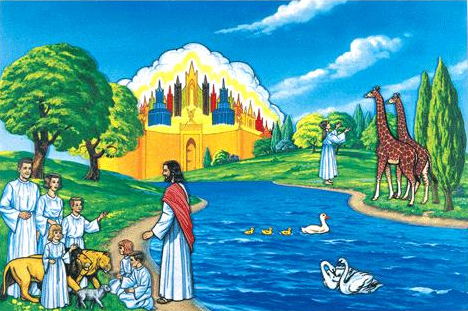The Top Six Myths We Believe About Heaven
It’s high time Heaven got in the news more often.
Since last week, God’s eternal dwelling Place has been cited in dozens of articles about a purportedly nonfiction book written by a(n) author(s) surnamed Malarkey.1 Last week on SpecFaith I shared the news and offered some quick thoughts.2 Now it seems right to offer a few more.3
If you wish to discuss the evangelical business/publishing side of the debate, stick around for tomorrow’s guest article by Randy Streu. Here I instead hope to re-raise the topic of Heaven and six major myths that even Christians believe about Heaven — and especially about God’s oft-ignored promised successor to Heaven, the New Heavens and New Earth.
1. Everybody goes to Heaven (except Hitler and other very bad people).

The classic flannelgraph scene of Heaven is quite biblical (with the disclaimer that Heaven will include more variety in skin tones and garment choice).
First, if you aren’t certain God is the most amazing loving Being in the universe, what would attract you to Heaven? What in the world could make Heaven a paradise apart from Him?
Second, could you really be satisfied with any good pleasure that exists — food, learning, travel, material goods, sex, rest, work — for ever and ever, with no challenge or variation or basis in Someone perfect and infinite and greater than all those things? Wouldn’t such a place be not like Heaven but actually the Other Place?
Only a God-centered person (as the Christian is becoming) is able to find true joy because the only joy humans could ever find is with God the Creator at the center of everything.
2. Heaven is the God-centered person’s (a Christian’s) final destination.
Among Christians this may be the biggest Heaven myth.
No, it’s not a heresy. No, it doesn’t make you unspiritual. But it does lead to uncertainties about our life now that are at best unnecessary and at worst actively harmful.
As Mike Wittmer recently put it:
What happens when people die? Their bodies and souls are unnaturally torn apart; their bodies stay here while their souls go to either heaven or hell. Praise God that those who die in Christ go to heaven, but never forget that this isn’t the way it’s supposed to be. The only reason anyone ever goes to heaven is because of sin.
More importantly, Scripture forecasts a literally heaven-shaking change for Heaven:
Then I saw a new heaven and a new earth, for the first heaven and the first earth had passed away, and the sea was no more. And I saw the holy city, new Jerusalem, coming down out of heaven from God, prepared as a bride adorned for her husband. And I heard a loud voice from the throne saying, “Behold, the dwelling place of God is with man. He will dwell with them, and they will be his people, and God himself will be with them as their God.
— Rev. 21:1-3
From what I’ve seen, all the “heaven tourism” books ignore this promise. It’s one case when the firm truth of Scripture is more obviously joyous than man’s shallow replacement.
3. Christians shouldn’t try to imagine what Heaven will be like.
 For me, author Randy Alcorn was the first person to challenge, clearly and biblically, the notion that Christians would best avoid imagining Heaven (and can ignore New Earth).
For me, author Randy Alcorn was the first person to challenge, clearly and biblically, the notion that Christians would best avoid imagining Heaven (and can ignore New Earth).
In Heaven chapter 2 (PDF), Alcorn says many Christians fear going too far with the whole topic and thus avoid even a healthful use of their imaginations:
… God has given us glimpses of Heaven in the Bible—to fire up our imagination and kindle a desire for Heaven in our hearts. And what’s why Satan will always discourage our imagination—or misdirect it to ethereal notions that violate Scripture. As long as the resurrected universe remains either undesirable or unimaginable, Satan succeeds in sabotaging our love for Heaven.
Some with good intentions even use “silencer” verses to avoid the topic, such as 1 Cor. 2:9:
I said to [one pastor who misquoted the text] what I always say: “You didn’t complete the sentence. You also have to read verse ten.” Here’s how the complete sentence reads: “‘No eye has seen, no ear has heard, no mind has conceived what God has prepared for those who love him’—but God has revealed it to us by his Spirit” (emphasis added). The context makes it clear that this revelation is God’s Word (v. 13), which tells us what God has prepared for us.
4. Heaven currently has streets of gold, pearly gates, etc.
For all we know the present-day Heaven could have these things. Again, it’s not sinful or less-spiritual to speculate within Scriptural parameters. But as C. Michael Patton notes about such popular images (which are reflected in many “I went to heaven” books):
If the streets of heaven are made of literal gold, this does not come until the new heavens and earth are created (Rev. 21:21)
Scripture only describes golden streets in the New Jerusalem. This is not simply a nonliteral stand-in for present-day reality but (in some form) a prophecy of a literal and future place.
5. Heaven won’t have non-sinful yet ‘earthly’ elements like food, drink, books, adventures, culture, or even popular culture (stories and songs)
Even Alcorn waxes slightly uncertain about whether humans could enjoy actual DVD discs, dictionaries, or even daiquiris in the renewed paradise of New Earth.
 I am more convinced there is no biblical reason even to cast suspicion on these human-made things (though sinful man currently and constantly uses these things to help him sin). If New Earth is this physical planet, only fire-blasted of all sin (2 Peter 3), then why not presume that at least some of man’s good devices — made even incidentally according to God’s cultural mandate — would survive or be remade? Why presume (as many do) that even if God’s new world is physical, we will revert to an agrarian or “primitive” lifestyle?
I am more convinced there is no biblical reason even to cast suspicion on these human-made things (though sinful man currently and constantly uses these things to help him sin). If New Earth is this physical planet, only fire-blasted of all sin (2 Peter 3), then why not presume that at least some of man’s good devices — made even incidentally according to God’s cultural mandate — would survive or be remade? Why presume (as many do) that even if God’s new world is physical, we will revert to an agrarian or “primitive” lifestyle?
For more on this idea, along with how this supports fantastical storytelling and can actually help us fight temptations to materialism, see the Will Fiction Last Forever? series.
6. ‘Don’t be so heavenly minded that you’re of no earthly good.’
This is an especially annoying bit of folk wisdom about Heaven. It presumes odd myths like:
- Some truth, even truth God has chosen to reveal to His people, is always dangerous. (But God’s truth is not intrinsically dangerous. Only lies can harm God’s people.)
- God did not directly promise His future renewal of creation where His people will live forever and enjoy His gifts such as work, dancing, singing, culture, trade, ships, cities and gardens. (But He did, and there is no biblical cause to ignore these truths.)
- The central problem is that other people “think too much” about Heaven in the first place. (But the problem instead is that people think too unbiblically about Heaven.)
All that is nonsense. I would even say all those notions have no place in biblical Christianity.
We might as well say, “Don’t be so Jesus-minded that you’re of no human good” — as if thinking “too much” about Jesus will distract us from the needs of people around us.
Rather, the Christians who strive to study biblical truth about Heaven and especially the future New Heavens and New Earth, and who base their anticipations and imaginations on biblical truth, will also think more biblically and faithfully and lovingly about this Earth.
 As C.S. Lewis wrote in Mere Christianity:
As C.S. Lewis wrote in Mere Christianity:
Looking forward to the eternal world, is not, as some suppose, a form of escapism or wishful thinking. It is one of the things a Christian is meant to do. It does not mean we are to leave this present world as it is. If you read history you will find that the Christians who did the most for the present world were just those who thought the most of the next. Aim for heaven and you get earth thrown in.
Thus, if you study the Bible, enjoy God’s truth and use it anticipate and imagine a fantastical Jesus-centered world purged of sin and death — and if you also work to reject unbiblical, joyless vague, and man-centered notions about Heaven — your faith will grow stronger.
Did I miss any myths? Have you ever changed your views of Heaven and/or the world beyond?
- Here is an idea: People could use this surname as the basis for a terrific joke that calls into question the validity of the book and its contents. ↩
- Since then the best article I’ve seen that surveys the tragic debacle is from The Guardian here. ↩
- This also seems worth interrupting The State of Christian Fantastical Fiction 2015 feature series. ↩











































Um, I think you are actually guilty of misunderstanding people in this article. When people say “Heaven” they usually mean (though they often don’t think it out enough to define it as such) “being in the presence of God forever.” As such, the term covers both what you are calling “heaven” that exists now AND also the new heaven and new Earth that I agree will be created after the Millennium and which does not exist now. Using broad terminology is not in fact an error–it is just a different way of thinking. It would be a bit like someone in Old Testament times referring to the coming of the Messiah and saying the prophets foretell he will heal the sick and make the lame walk and rule as king over Israel forever.
That thought in an Old Testament believer’s mind would in fact be correct–the coming of the Messiah IS to be associated with all those things. The fact they do not all come at once, that there are two comings of the Messiah, is not really an error, even if it indicates a lack of understanding (and the rule of the Messiah cannot be limited to the 1000 year reign either, for that matter, because he will also rule in eternity). So it certainly would be a mistake for someone to declare their point of view a “myth.”
Likewise you are in error not to see that as a broad term, “heaven” usually incorporates BOTH where a person goes now after death AND the new heavens and the new Earth. Conflation of two things into one broader category is not an error per se–it is only if you get technical–which I do not believe justifies your use of the term “myth.” FYI.
Thanks for your constructive criticism! In return I would offer one central challenge: there are details about New Earth that many Christians apply as exclusive to the present-day Heaven, while ignoring New Earth altogether.
(A parallel would be insisting that Jesus is only a suffering servant and not a victorious King, or else a victorious King and not a suffering servant.)
For example, it is simply incorrect to act as if Heaven — an “up there” or “out there” version that does presently exist but will not stay the same — is our final destination. It’s also incorrect, and unhelpful to our growth, to refer to the present-day Heaven’s “streets of gold” and so forth, because these prophecies are exclusive to the future (not yet) New Jerusalem, the spiritual/physical capital City of New Earth.
Similarly, many of the “heaven tourism” books’ descriptions of Heaven mention earthly scenes and elements such as green fields and animals in the present-day Heaven, but there is no indication today’s Heaven residents enjoy those resurrected creations or that even they await a future event.)
Moreover, regardless of what “stage” of Heaven we are discussing — present or future — most popular imagery of Heaven is utterly void of those very things that God commanded man to do: be fruitful, multiply, and make culture. I am saying that Christians must recover a biblical vision for the eternal purpose of these things, lest we either ignore them or (perhaps worse) continue to use them for our own amusements and not God’s glory.
Anyway, in this article I attempted to stick with the overarching myths about Heaven, such as no. 1: that everybody (except Hilter, et. al.) goes there, or that it is somehow against God’s will to imagine our eternal state.
P.S.: I’m fine with using the term “Heaven” as a catch-all term that refers to Heaven today (not united with Earth) and heaven future (united with Earth).
But that’s not the way many Christians are defining the term. Instead they define it as a Heaven “out there,” and Earth “right here” (an Earth that will someday be utterly obliterated), and ne’er the twain shall meet a la Rev. 21.
5 is tricky. Really tricky. It’s not that there’s Biblical cause to doubt, but the problem is something like this story of two old desert fathers:
We may not have stories because we’ll live in a world where the idea of arguments, or even of people getting mad enough to hurt one another will be alien to us. We won’t know death, not in the sense that if we’re killed we’ll just upload our personalities to a new body but in the sense that we never will die or will have cause to die or kill.
Imagine a story where you had a person saying “I want to rule the world!” Then everyone says, “okay, the world is yours. Take it and go, so your joy may be full.” A lot of the stories we have now reflect the fact that sin and death are in the world, and when both are gone, I’m not sure we can say everything is the same. You need to be wary of putting too much of us into the future, as we aren’t transformed yet.
I think this assumption that people cannot have arguments or even honest differences without also sinning. But I must disagree with that assumption.
First, and not just based on personal (and even very immediate! 😀 ) experience, I know that I’ve had multiple arguments with folks and only had enjoyable experiences. In fact, this is how I’ve made (and kept?) many friends. Perhaps the best word then is not “argument” but “debate.” Debate is not itself sinful. Nor is competition sinful, for then differences in belief and theory and even humanity itself (with all its many ethnic and cultural even perhaps even denominational differences!) would be intrinsically sinful.
Second, I don’t believe that disagreement or even a joyful experience of “negative” emotions themselves are sinful. Therefore, true-life stories that include these elements could last forever. I can base this first on Scripture:
And also on biblical truth about our memories that comprise our stories:
So if God’s Story, “negative” content and all, will last forever, and if God’s stories for us, “negative” content and all, will always be remembered, it’s not much of a stretch — especially given the cultural mandate that God has not abandoned — to believe that manmade stories and things would also continue (in some form) in the New Earth and glorify God. And these stories would, necessarily, include true or fictitious conflicts and “negative content” that would glorify God by contrasting how we will at last be living.
As one Doctor Who heroine said, this “sad [will be] happy for deep people.”
It’s not a memory wipe, but more a realization that we will be changed in profound ways. Fulfilled might be a better word. We debate now because we have imperfect information, but in Heaven debate is fulfilled because the Truth literally walks among us. I’m not sure how the fulfilled man will relate to the past things of when we were incomplete.
The argument story is funny because it shows how different that kind of life would be. I’m not sure how we’d even relate to stories when we’d be so changed. I’m hesitant about saying much about heaven precisely because of that.
I think these are interesting ideas, but without direct Scriptural support I think they fall under the category of speculation. And I think the ideas do contradict Scripture’s overt promises that New Earth will have a lot of continuity with this world, at least more than we often presume. New Earths’ baseline is this very planet, a place that is renewed and purged of all sin and suffering, similar to how human beings will be resurrected and purged from all sin and suffering.
But I’m very wary, and consider extra-biblical at best, ideas that go too far in emphasizing how different everything will be — to the point of rendering everything overly vague or surreal. When the Bible speaks about the future New Earth, it speaks in very Earthly terms. The very term “New Earth” connotes a new version of the same planet, just as Paul’s clarified promises that people will be sowed a fleshly body and raised a spiritual body — a Spirit-powered body — connotes continuity.
I’ve not seen any Scriptural support for an idea that human beings will know all truth just because Jesus is among us. But apart from evidence one way or another, consider the logic. Would this not make humans omniscient on a level reserved for God alone? Would this not strip away a non-sinful aspect of humanity — the fact that we do not know all things and like to enjoy talking and learning? If we suddenly knew all things and did not need to discuss and study and learn, what sin-consequence does this fix? I don’t believe ignorance of a thing qualifies as a sin. And in fact, it can be a great joy. I do not expect to know everything about divine mysteries such as the the Trinity or even the exact mechanics of salvation. Rather, I imagine the joys of spending millennia or even all of eternity trying to resolve such mysteries and even disagreeing with others about how it all works and thus glorifying God who does know.
In fact, that is similar to what we’re doing now. We disagree, but no one has sinned. And I hope I am not the only one enjoying this discussion.
It’s not that we’d be omniscient. It would be more like “Oh, let’s ask God.” Or that we can perceive God directly enough to get the truth. And if we’re without sin, we’d be without a lot of the things that lead us to untruths or disputations, or situations where we’d only see limited aspects of the truth. Like we’d never get tired, or never get irrational and expect someone is something they are not, etc.
Human nature would change into its perfected form, or the form it was meant to be in. In some ways it’d be familiar, but in some ways it’d really be alien to us now. Kind of like a science fiction novel where a person becomes a robot; the best novels would show the changes that no longer being human would produce. Or like being a child; once you grow up, you’re no longer possible of having that mindset. You become something completely different than the child could foresee.
Like we are all children in the Lord now, and heaven will be us finally growing up. It’s hard to conceive of that at times, and makes me a little hesitant to speculate on the changes that happen then.
Thank you for this.
This is why I read Speculative Faith. This is a better explanation of both heaven and hell. I hope that the New Earth will be real and that there we can do things that actually are real, and be truly real ourselves. I hope God will make me and the people I’ve known in this life real enough to exist there. I can’t tell people to pray to Jesus to go to heaven; I only hope that they ultimately love ultimate Goodness. I hope the same of myself, and that some day we might really be able to come together to be able to create something real.
Thanks, Bainespal.
If I were in a discussion with a non-Christian about Jesus, I would not even mention Heaven at first — either the misunderstood version or the corrected and biblical vision of New Earth and a redeemed paradise. Otherwise in either case, we risk making conversion about anything other than repenting of sin that we can finally draw near to Jesus Christ.
That’s why I dislike evangelism scenarios that could go something like this:
(E.g., we don’t talk about it because “no eye has seen …” [1 Cor. 2:9a].)
Really, this is a topic mainly for those who are already Christians. If you’re speaking with a nonbeliever, don’t make it all about “living in heaven.” That can be a severe distraction. Focus entirely on the Hero who saves wretched enemies from ourselves and from our rebellion against Him — Jesus Christ.
Asking whether someone thought he or she was going to heaven or hell is one of the evangelism techniques I was trained in. In other situations we were supposed to point to the circle with the cross on the throne symbol and the one next to it with the cross outside the circle and ask which one he or she identified with.
We still don’t know exactly how Jesus saves or exactly who He saves. Only that He saves. (We can’t earn salvation by choosing it -> God has to save us -> how does He do that in our real-life experience of time and space?) I think the only legitimate “method” for evangelism is honesty. (A believer who was “saved” as an adult could perhaps honestly tell people to receive Jesus, but every time I’ve tried to do that it was dishonest and false because I can’t attest to God definitively saving a person in real time.) But sorry for derailing. I need to block myself from commenting on all my browsers again. 🙂
By the way, here is a sillier way to make one of the same above points.
Thank you to the writer of the article – I appreciate the wisdom. Yes many seem to believe that Heaven rather than the new earth will be the believers’ final destination. But like Stephen said above. ” I’m fine with using the term “Heaven” as a catch-all term that refers to Heaven today (not united with Earth) and heaven future (united with Earth).” That’s how I perceive it when I refer to Heaven & when trying to share the gospel. I really enjoyed reading the article and entire thread/ comments. @ E. Stephen Burnett – really enjoyed reading your outlook. Learned a lot. Thank you. And thank you everyone else.
When we die our souls do not go straight to heaven or hell! When we die we go to the grave. Our bodies and souls are dead. Then when Jesus retuns we will be resurrected and go to heaven with Him but the wicked living will be destroyed, and tthe wicked dead will stay dead. Then at the end of the millenium the wicked will be raised, then the earth and all the wicked will be burned up. Then the earth will be made new again. Check out the utube lecture “Walter veith. The mystic realm of death”.